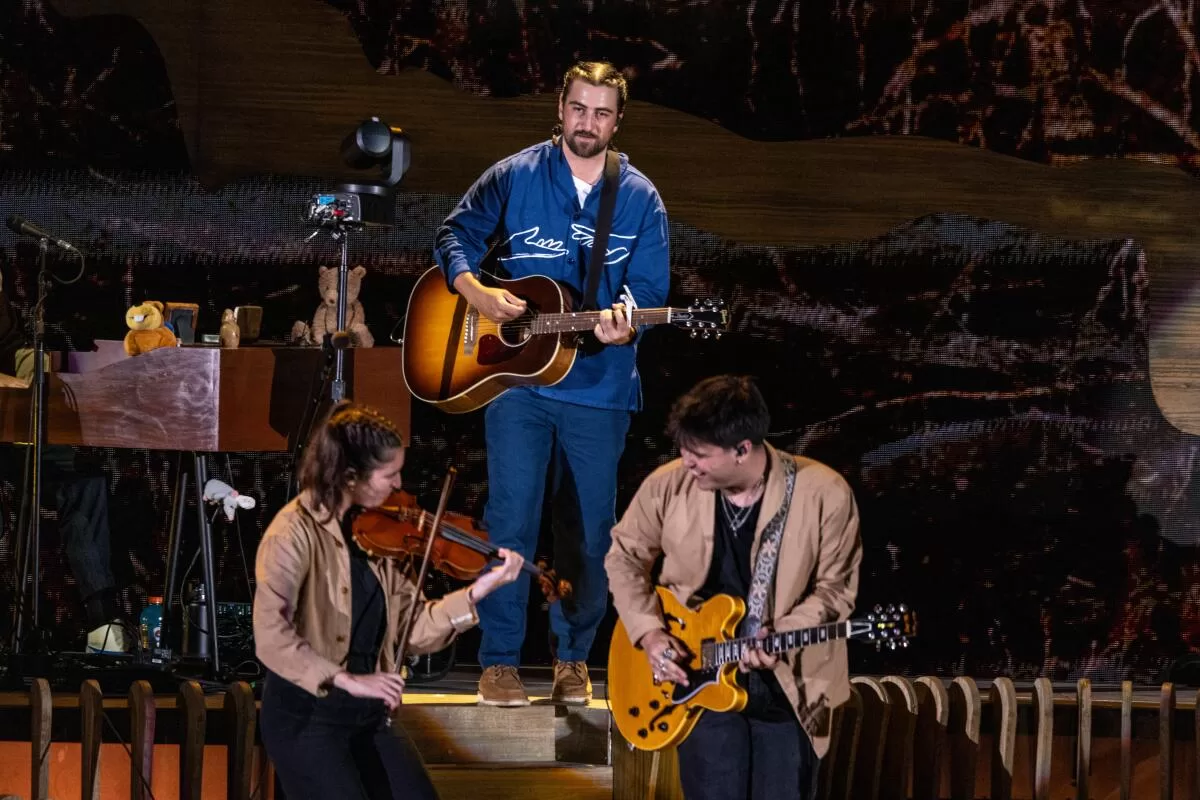There, Kahan, a 27-year-old Vermont folk singer who’s captured TikTok’s Gen Z romantics, got nearly every one of his plaintive lyrics absolutely howled back at him. It was visceral, “Eras”-caliber catharsis, even in the quiet parts (maybe especially in the quiet parts). No Vermonter has been greeted with such arena-rock delirium since Bernie Sanders.
Listening to Kahan’s 2022 LP “Stick Season,” which won him a Grammy nomination for best new artist, you might not expect that kind of reaction. It’s an intimate, cable-knit record full of fingerpicking and lyrical detail specific to his life and autumnal hometown. His stage setup at the Bowl included a re-creation of his childhood living room.
But every few years, pop gets its Dashboard Confessional on MTV Unplugged moment — a new singer-songwriter who transcends whatever else is happening on the charts and nails something in the ready hearts of young people. This is Kahan’s season for such a feat.
Kahan — a bearded, disarmingly candid songwriter with a very cute dog in his album art and a mental health charity called the Busyhead Project — signed to Republic in 2017. He released a pair of LPs that didn’t connect with a mass audience. But he did a smart thing with the single “Stick Season,” teasing very early drafts of it on TikTok in late 2020 that nailed a going-back-to-campus melancholy in a fraught time (“I am terrified of weather ‘cause I see you when it rains / Doc told me to travel, but there’s COVID on the planes.”)
Upon release in 2022, the single hit No. 9 on the Billboard Hot 100 and the album reached No. 2 on the Hot 200, with a much-expanded edition released in February as momentum built. Kahan was a savvy collaborator, roping guest appearances or co-writes with Post Malone, Zach Bryan, Lainey Wilson, Kacey Musgraves, Brandi Carlile and Hozier. Olivia Rodrigo covered him. If your algorithm ever once detected an interest in lovesick fingerpicking, you found your way to Noah Kahan.

(Jason Armond / Los Angeles Times)
He gets ribbed for allegedly reviving the strain of ”stomp-clap” indie-folk popularized by Mumford & Sons in the 2010s. That comparison is unfair though, given country music’s sweep through every other genre today. At the Bowl on Thursday, tens of thousands of very young fans found their own internet-age Americana.
From the opener “Dial Drunk” — a pretty great drunk-tank ballad for a generation forswearing booze — Kahan ginned up a Springsteen-caliber lore for himself and his hometown.
Wearing Willie Nelson braids and endearingly bleak with his banter (“Any children of divorce here? Let me hear you say ‘Dad’s house is empty and weird.’”), Kahan was brutally sincere in his music, yet self-effacing about his status as a new pop star.
He could play a song like “Forever,” where he longs for “the edges of your soul I haven’t seen yet,” and immediately joke afterward that “I’m feeling like a manipulative youth pastor. Like ‘Jesus has rizz.’”
The specifics of Kahan’s aesthetic — trees emptied of greenery, childhood homes dripping with trauma, alcohol soaking through a freezing winter — are the real hook for the devoted. A New England schoolbook fixture became a kind of cowboy symbol on “Paul Revere,” and in “Come Over,” he paid close read to the place that made him like this — “my house was designed to kinda look like it’s crying / When they mention the sad kid in a sad house on Balch Street / You won’t have to guess who they’re speaking about.”
He’s a gifted musician beneath all of that — Kahan uncorked a pretty falsetto on “You’re Gonna Go Far,” and got genuinely heavy on a harrowing “The Great Divide.” He tackled more adult concerns compellingly on “Orange Juice,” where the shame of new sobriety got profound weight in the details — “There’s orange juice in the kitchen, bought for the children / It’s yours if you want it, we’re just glad you could visit.”
Kahan’s old enough to want a place in the songwriter canon, but still a little bound to the college-age melodrama that made him famous.
There’s no time limit on being “angry at my parents for what their parents did to them,” as he sang on “Growing Sideways,” but there was something a little too savvy about taking to a lone microphone in the middle of the audience to sing about how he “took my medication and I poured my trauma out / on some sad-eyed, middle-aged man’s overpriced new leather couch.” Everyone in that well-therapized crowd has probably had that conversation, and Kahan knew to hit them where they lived.
For now, Kahan is walking an intriguing path among the country-music revival, TikTok’s hitmaking acumen and an ultra-intense fan culture. Thursday’s show proved why it happened to him — he’s well-honed and self-aware in his craft, splitting the difference between the world-building of Taylor Swift with the stately miserablism of Conor Oberst. Is it for the ages? Maybe someday. But Noah Kahan as a genuine pop star today? That’s worth stomping and clapping about.
